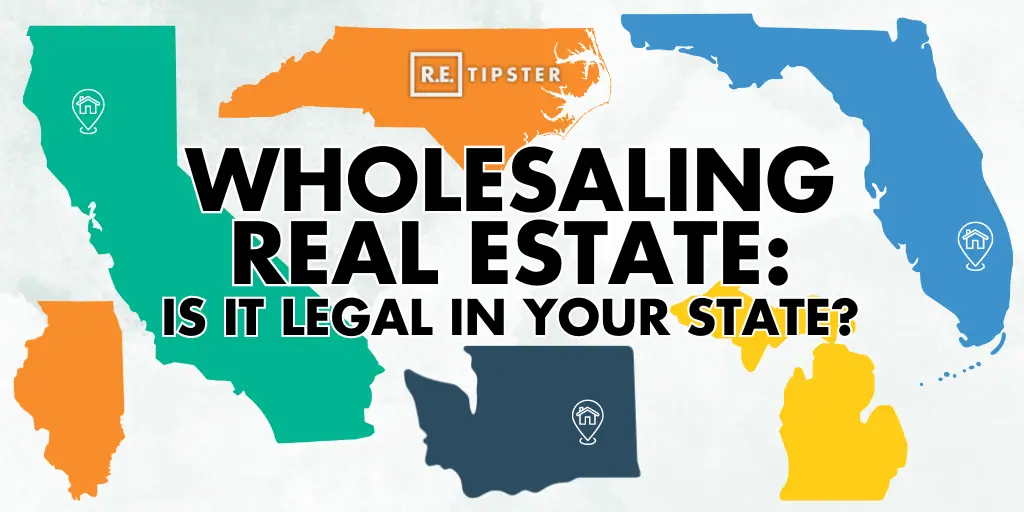
REtipster does not provide legal advice. The information in this article can be impacted by many unique variables. Always consult with a qualified legal professional before taking action.
If you're a real estate investor who has been in the game for any length of time, you've probably heard about the practice of “wholesaling.”
In a nutshell, wholesaling is when an investor signs a purchase agreement with a seller and then sells or “assigns” that contract to another buyer for a fee (usually $5K —$10K, but sometimes much more).
This is typically done through an assignment clause in the original purchase contract, which allows the wholesaler to sell their rights to the contract to someone else.
Another common wholesaling method is the “double closing,” in which the investor closes on the property, briefly holds it, and immediately resells it to another buyer.
This allows the investor to conceal their profit from the end buyer. Double closings are often reserved for deals where the wholesaler stands to make a lot more money, but they're essentially a different method of accomplishing the same thing: making money from a profit without the risk of long-term ownership.
The Controversy Around Wholesaling
As this popular niche of real estate investing has evolved, wholesaling has become an increasingly controversial topic in the real estate world.
Some states have enacted laws that prohibit or restrict the practice of assigning contracts or double closing without a real estate license. Jerry Norton has done a great job explaining which states require which requirements on his YouTube channel.
The argument is that wholesalers are trying to do the same thing as licensed real estate agents—facilitating the sale of properties they don't own, but simply have under contract, and collecting a fee.
Even though the contracts used in wholesaling are legally distinct from those used by licensed agents, some states contend that they still constitute the unlicensed practice of real estate.
Those in favor of wholesaling argue that it's a legitimate investing strategy that provides a valuable service to sellers who need to sell quickly and may be unable to wait for a traditional buyer. If the wholesaler has a valid contract with the seller and isn't misrepresenting themselves, they should be free to assign that contract or resell the property.
The problem is that some wholesalers don't communicate the process well with the seller, and the seller agrees to sell the property without understanding what's happening.
Even if a wholesaler does a perfect job of documenting and communicating the process, they're still competing with licensed real estate agents. This has mobilized an army of agents to oppose the practice of wholesaling in some states.
Why This Matters for Real Estate Investors
Regardless of where you stand on the wholesaling debate, the fact is that the legal landscape is shifting.
If you're a real estate investor who relies on wholesaling as part of your strategy, it's crucial to understand the laws and regulations in your state.
It's also crucial to understand the nuance of these laws. Some states have very strangely worded rules that leave much room for different interpretations. Other states clarify that certain wholesaling forms are illegal (like assigning contracts), but others are fine (like double closings).
Whichever state you're curious about, take the time to read the law for yourself and understand precisely what is and isn't allowed in that state.
This is not a black-and-white issue; the answer isn't simply ‘yes' or ‘no' in each state. The map below is just a starting point to help guide you along the way, but you need to do your research before taking action.
Violating these laws, even unintentionally, could result in hefty fines and other penalties. In some cases, it could even jeopardize your ability to continue investing in real estate.
Click on your state for a summary of the relevant regulations and links to additional resources.
Legal Disclaimer: The laws and regulations in each state are constantly changing. We've done our best to assemble the most relevant and up-to-date information around the country, but we cannot guarantee the accuracy of this map. Always consult with a qualified legal professional in the state where your property is located to ensure you comply. Don't let a simple misunderstanding derail your real estate investing career.
Disclosures
No matter what state you're working in and regardless of which kind of wholesaling maneuver you're trying to use, it's always a good idea to communicate clearly with the seller about what you intend to do.
Wholesaling has been outlawed in certain markets because many real estate wholesalers have done a terrible job of communicating their intent and/or failing to set proper expectations with sellers from the outset.
If proper expectations are set and good communication is maintained throughout the entire process, there should be little room for misunderstandings or disappointment from sellers.
The Bottom Line
Wholesaling can be a powerful tool for real estate investors, but it has risks and challenges, even when there is no legal case against it.
As the legal environment evolves, staying informed and adapting your strategy is more important than ever.
Whether you pursue wholesaling or focus on other investing methods, remember that success in real estate requires constant learning and a willingness to pivot when necessary. Stay nimble, stay compliant, and keep growing.









